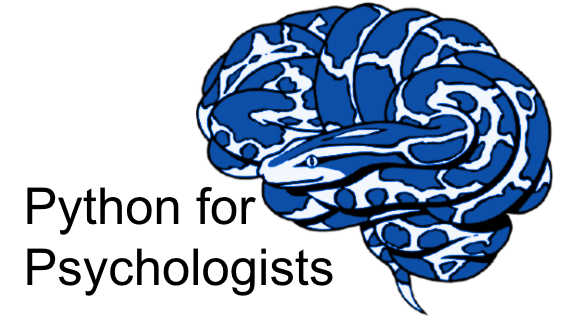Welcome!
Contents

Welcome!¶
Hello everyone and welcome to the course page for “Python for Psychologists”, taught within the Psychology master programme of the Goethe-University Frankfurt during the winter term 2021. We’re glad to see you here!
Within these pages, we provide the all information important to follow and conduct the course, including formal aspects, requirements, lecture materials, practicals and so on. This jupyter book will include the used slides and code in a way that they can be explored in an interactive manner. You can navigate through the respective sections via the TOC on the left side and within sections via the TOC on the right side. The three symbols in the top allow to enable full screen mode, link to the underlying Github repository and allow you to download the contents as a pdf or jupyter notebook respectively. Some sections will additionally have a little rocket in that row which will allow you to interactively rerun certain parts of the practicals via cloud computing. Additionally, we support public reviews and comments through an hypothes.is plugin with which you can interact on the right side. All of this awesomeness (talking about the infrastructure and resource) is possible through the dedicated and second to none work of the Jupyter community, specifically, the Executable/Jupyter Book and mybinder project.
Python for Psychologists¶
Within this course we will explore the Python programming language, specifically how it can be and why it should be utilized within experimental
psychology. To do so, we will follow a “learning by doing” approach in a tripartite manner. Starting from a basic introduction into programming and python (Block I), we will evaluate how python can be used to run experiments (Block II) and analyze the resulting data (Block III). Thus, we actively seek out realistic examples and workflows, trying to solve problems with python. Along this way we will also talk about important adjacent topics such as computing environments and IDEs. For a rather precise outline of the course, please consult the respective section.
This course is designed to provide lecture content in a way that it is FAIR for as many people as possible.
You can use the following sections to navigate through the content of the lecture:
-
What’s this course all about? How are things implemented and supposed to work?
-
What are the specific topics and aspects taught?
-
All things gotta start somewhere and using programming within research settings is no exception to that, but how?
-
How can you use python to conduct experiments to acquire data from participants?
-
How can you use python to obtain insights from data, including preprocessing, statistics and visualizations?
-
Making sure the work and progress of the participants is transparent and documented.
-
Was it worth it and how can this be evaluated?
-
Necessities for creating an open, fair, safe and inclusive learning experience.
I’ve got a question!¶
In case you have any questions or difficulties with the lecture and its materials, please don’t hesitate a single second to get in touch with us. A great way to do this is to open an issue on the GitHub site of the course. Every feedback or idea or you might have is also highly appreciated and valued.
Acknowledgements¶
Peer Herholz’ work on and ability to compile this course was enabled through training received at the Montreal Neurological Institute, specifically the NeuroDataScience - ORIGAMI lab supported by funding from the Canada First Research Excellence Fund, awarded to McGill University for the Healthy Brains for Healthy Lives initiative, the National Institutes of Health (NIH) NIH-NIBIB P41 EB019936 (ReproNim), the National Institute Of Mental Health of the NIH under Award Number R01MH096906 (Neurosynth), a research scholar award from Brain Canada, in partnership with Health Canada, for the Canadian Open Neuroscience Platform initiative, as well as an Excellence Scholarship from Unifying Neuroscience and Artificial Intelligence - Québec.
